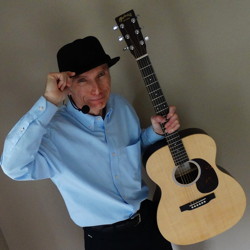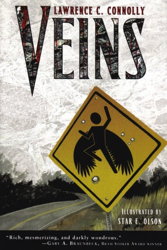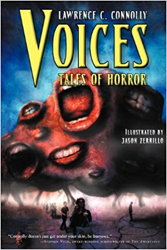
Here in southeastern Pennsylvania, winter has arrived though the solstice is still most of a week away. Temperatures have dipped into the teens some nights and we’ve had three separate snowfalls by my count. I’ve had to do some light shoveling and yesterday I bought some rock salt. That ritual, buying rock salt, is what convinces me we’re really into winter.
None of which has anything to do with Lawrence C. Connolly, this week’s EATING AUTHORS guest, but you know, these blog posts have to start somehow, and as he’s from western PA this seemed like a plausible opening.
As you may infer from his photo, Lawrence is a musician. But space is tight so I’m going to focus on his fiction (though some of his compositions do that as well). He started out writing SF but soon found that horror let him do more of what he wanted. He’s perhaps best known as the author of the Veins cycle of novels (Veins, Vipers, and Vortex). I think it’s fair to say he’s found his niche, and Hollywood agrees. His story, This Way To Egress, has been adapted for the big screen by director David Slade (of Hannibal and American Gods fame). You’ll be able to see it in 2018 as one of five shorts in Nightmare Cinema .

LMS: Welcome, Lawrence. What stands out as your most memorable meal?
LCC: It’s March 1990, the last month of the last winter of the cold war. And I’m in Russia.
I’m part of a group of writers, musicians, and performers who are taking part in a cultural exchange with a music school in Leningrad, and tonight one of our hosts has invited us to dinner at her flat in the city.
The apartment is on the sixth floor of a Khrushchev-era housing unit, a massive concrete structure with labyrinthian corridors and echoing stairwells. It’s intimidating. But the apartment, when we finally reach it, is warm and bright.
The dining area is a multi-functional space, living-room furniture pushed aside to make way for a large table. It’s already set for us – plates, silverware, pickles, vodka. Lots of vodka.
My place is next to the host’s grandfather, an amiable man with an infectious smile.
My Russian is limited to a few badly pronounced phrases. Things that are supposed to mean Hello, Thank you, and Where is the toilet? The grandfather knows about as much English. His favorite word is More, which he repeats each time he fills my glass with vodka. I will learn later that in Russia one never lets a guest’s glass stand empty.
“More!â€
“No. I’m fine.â€
He pours.
It’s been said that words constitute seven-percent of what we say, far less than vocal tone, body language, and facial expression. More might be the only English we have in common, but that infectious smile reaches me all the same.
Dinner features kholodets, cold meat suspended in gelatin. The dish is served during winter celebrations, and we are certainly celebrating on that cold March night – breaking bread, breaking barriers. Decades of cold war have made us strangers, but one hour at that table changes everything.
An upright piano stands in a corner, packed in among the living-room furniture.
“More!â€
“Sure. Why not. Can we play the piano?â€
He doesn’t understand my words. He doesn’t need to. My gestures make my meaning clear.
The rest of the night is devoted to those other international languages – music and song.
It all ends too soon. We leave the way we arrived, through labyrinthian halls and down echoing stairwells. Behind us, a voice calls out, singing a one-word wish and an open invitation to return.
More!

Thanks, Lawrence. I knew the trick of learning how to ask about the bathroom. It hadn’t occurred to me that knowing how to say “more” could be so practical. Lesson learned.
Next Monday: Another author and another meal!
Want to never miss an installment of EATING AUTHORS?
Click this link and sign up for a weekly email to bring you here as soon as they post.
#SFWApro
Tags: Eating Authors


